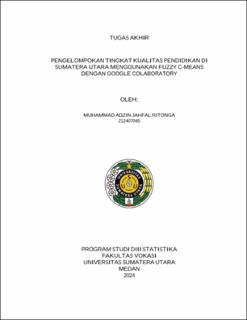Pengelompokan Tingkat Kualitas Pendidikan di Sumatera Utara Menggunakan Fuzzy C-Means dengan Google Colaboratory
Clustering the Quality of Education in North Sumatra Using Fuzzy C-Means with Google Colaboratory

Date
2024Author
Ritonga, Muhammad Adzin Jahfal
Advisor(s)
Syahputra, Muhammad Romi
Metadata
Show full item recordAbstract
Education is a vital aspect of regional development, closely related to social, economic, and cultural progress. In Indonesia, especially in North Sumatra, there is a significant disparity in educational quality that requires serious attention. Evaluating educational quality is essential to identify which sectors need more focus.This research aims to cluster the districts/cities in North Sumatra based on their educational quality using the Fuzzy C-Means method and to evaluate the effectiveness of this model in the clustering process.The data used in this research includes the Gross Enrollment Ratio (APK), Net Enrollment Ratio (APM), the percentage of residents who have graduated from high school (APT), the average length of schooling (RLS), expected years of schooling (HLS), and the Human Development Index (IPM). The analysis was conducted using the Fuzzy C-Means method with the assistance of the Google Colaboratory platform. The research results show the clustering of areas in North Sumatra based on varying educational quality. The Fuzzy C-Means method proved effective in clustering educational data, yielding reliable results for further analysis. Fuzzy C-Means with Google Colaboratory provides clear clustering results regarding the quality of education in North Sumatra. This research can serve as a basis for the government to prioritize areas that need more attention in efforts to improve educational quality.
Collections
- Diploma Papers [192]
